- Home
- A. S. King
Still Life With Tornado Page 11
Still Life With Tornado Read online
Page 11
• • •
Wednesday I leave for school because Dad wakes me up and makes me pretend. He stands at the door and tells me to have a nice day and to keep our deal and Mom is still asleep even though she didn’t work last night, and before I leave, I pack my backpack full of every piece of sidewalk chalk we have.
And I go.
I stop at the food cart where they sell the best breakfast sandwiches. The woman’s smile is art. The way she pronounces oregano. The way her husband fries the egg so it fits the roll, the way he places the ham and cheese on top—the way he folds it once the cheese is melted, the way he scoops the whole thing up and lays it on the roll is art.
I walk to the corner of South and 4th and I watch the tourists try to figure out which cheesesteak place to go to. Pat’s or Jim’s? That’s the question. That’s always the question. Truth is, the difference between these two cheesesteaks is so large that you should try them both. Everyone has an opinion about which one is the most authentic but what does authentic have to do with anything anymore?
Cheesesteaks are art. Some art is Rembrandt. Some art is Rothko.
I find a place on the sidewalk to doodle with my chalk. I’m still in yesterday’s clothes. Some people throw me a quarter around noon. They just toss it like I’m a fountain and they made a wish.
Here’s what I decide they wished: They wished they knew which cheesesteak place was the right one.
If they would have asked, I would have told their fortune. Beware of any cheesesteak with bright orange liquid cheese.
I draw nothing. Just big blobs of color. Nothing comes to me. Did you ever see those people who draw those 3-D masterpieces with sidewalk chalk? I want to draw that. But I don’t know how to draw that. I don’t even know where to start. So I just rub the chalk against the sidewalk and I make dust. This doesn’t feel like art—probably because I’m not enjoying myself at all. At least the breakfast sandwich couple love what they do. Or maybe they have to. Or something. Either way, this doesn’t feel like art and I don’t care. I am relieved that I’ve gotten it out of my system. Pesky art. Who needs it?
• • •
At dinner, Mom and Dad notice I’m still wearing the same clothing I’ve had on since Monday. Mom says something about my washing my hair. Dad says that my shirt is filthy and points at the chalk markings on my jeans.
No one asks me where I was all day.
Mom and Dad both look exhausted like they do sometimes. It’s not work exhaustion. It’s something else. They have exhausted each other. This is clear because they don’t make eye contact. Maybe it was one of those parental meetings they do. I assume it’s where they make those parental deals. From here it looks like they spent the whole day at the tilt, wearing hundreds of pounds of armor and racing toward each other on horseback. If I was to guess the outcome, Dad won.
• • •
Thursday and Friday I walk up Broad Street as far as I can and I sing. I sing anything. I sing “Jingle Bells” even though it’s May. I sing nursery rhymes. I sing songs I learned to sing when I still took piano lessons.
No one on Broad Street says anything to me. But I’m not listening so it’s not like I’d hear it anyway. By Friday afternoon, I think I might have gone crazy. I am not the Sarah I used to be. I am a different Sarah. I don’t hear people anymore. I hear birds. I try to figure out what the pigeons are cooing to each other. I eat out of trash cans even though I have five dollars in my wallet. I walk even though I have a SEPTA pass.
I don’t care about the pear I couldn’t draw. I don’t care about Bruce. I don’t care about Mexico. I don’t care if I stay this way forever.
I wanted to go to my new school one more day this week, but I didn’t manage to get there. I have no idea what I’m doing and I don’t know why I’m doing it. Part of me wants to stand naked in the middle of Broad Street with pineapple stuffing rubbed all over me while throwing imaginary vegetables at people. Another part of me wants to climb to the top of Liberty One and yodel until my throat bleeds.
I should probably see a psychologist.
I’m halfway home on Friday afternoon when I see a little girl with a dog. I’m too tired to follow them, but I want to follow them because I can’t figure out why a girl this young would be allowed out alone with her dog in this part of town.
Maybe I don’t understand the neighborhood. Maybe I don’t understand the dog. Maybe I don’t understand the girl.
Something about the girl is original.
Something about the dog is original.
I ask the girl, “What is art?” and she says, “Art is what you believe no matter what other people think.” I grunt at this. I yell, “I don’t give a fucking tangerine what you think, girl! You think I’m out here trying to make friends?”
She and her dog recoil, and I try to figure out why I just yelled at her.
I think I might have become Alleged Earl even though Alleged Earl doesn’t want me to follow him anymore.
I think I care about art even though I don’t want to. I can’t get away from myself.
• • •
I see ten-year-old Sarah just outside City Hall. I wave to her but she doesn’t see me. She’s talking to another girl her age. I’m happy she’s made a friend. Her friend looks like Carmen did when we were ten.
I think about Carmen and how much I miss her. I don’t miss her much. I don’t miss anything much. I think this is a side effect of whatever is happening to me.
Carmen knows about the something in “Did something happen at school?”
She’s the only one who understands what’s inside a tornado. She’s the only one who understands that what’s inside me and what’s inside everyone who ever wanted to be an artist is a tornado. She seems okay with Miss Smith’s idea about no one having original ideas. I don’t know how she does it.
She is immune to discouragement.
I stop outside of City Hall and pull out a piece of sidewalk chalk. I draw an enormous tornado. Swirls and swirls of dust and debris. I walk three big steps at the top of the tornado—it’s ten feet wide at the top. The only color chalk I have is sky blue and it’s a sky-blue tornado and inside the tornado is everything that ever mattered to me and everything that ever mattered to you and every tourist and every Liberty Bell and every hot dog with mustard and every cheesesteak and every song I ever sang and every pigeon that ever cooed. They are all inside my tornado. I don’t notice anyone watching me. No one stops to care. No one asks me to stop but if they did I probably wouldn’t hear them anyway because I am still deaf to everyone except art—art that doesn’t matter. This tornado doesn’t matter. Not even with the skin from my index-finger knuckle in it. Not even with the sweat that dripped from my nose.
Then I turn around, City Hall at my back, and face the art museum down at the other end of the parkway and I yodel the best yodel I can as loud as I can. I sound like a bad imitation of Tarzan. If yodeling is art, I suck at it. I take my sucky yodel, put it inside my sky-blue tornado, and start walking home.
I can smell myself. I am so many days old I can smell more than just my sweat, I can smell my own five-day-old dirt. Dirt is art.
• • •
When I get home, Mom is already at work and Dad is downstairs on the couch watching TV. He says something to me as I walk to the kitchen but I don’t hear anything.
I see his mouth move, but I don’t hear him at all.
His frown is big.
He makes an animated smile and points to it.
I realize he’s telling me to smile.
As if smiling would make my tornado go away. As if what’s on the surface matters. That’s what Carmen taught me. That’s what her tornadoes have always been about.
I smile and I get myself a bowl of Cheerios.
I take it back to my room and smile on my way through the living room and I go to sleep with my five-da
y-old dirt and I don’t feel like art.
• • •
When I wake up on Saturday, Mom is heading to bed after her long night. I decide to paint my bedroom. The color in here is awful. It’s the worst green anyone ever imagined. No wonder I couldn’t draw the pear. I live inside of bile. It’s taken its toll.
I look on the computer for nicer colors and I find the perfect one. Vanilla Milkshake. It’s not quite white, and not quite yellow or brown. It’s warm. But it’s a milk shake so it’s cold.
That’s what color I paint my room.
I move all of my furniture into the center of the floor. I lie on my bed and start by staring into the southeast corner and I see myself on a step stool with a paint roller. This is too fake. I go to the hall closet and get the step stool and bring it to my room and I stand on it and roll my imaginary roller into the Vanilla Milkshake pan and then roll it onto the wall. I work my way around the room counterclockwise. Floor to ceiling. When I’m done I sit on my bed and I can see the truth: The truth is that you can’t paint over bile in just one coat.
I take a pretend nap and then when I wake up I decide the whole room is dry and I can put a second coat on. A Sarah is sitting on the end of my bed. She’s older.
“Forty,” she says.
“Oh,” I say. “Hi.”
“Do you want to talk about what happened in school?”
“No.”
“I know you walked in on Miss Smith kissing Vicky.”
“So?”
“So you can’t paint over that,” she says.
I think I can. I think I can paint over what I saw and unsee it and not tell anyone. I think I have to.
“You’re afraid to say anything because it would be your word against theirs?” she asks.
“You’re me. You know.”
“Well, you’re wrong. And she should be fired. Trust me. Vicky isn’t the first or the last one.”
I stop and stare at her. She’s calm. Soft around the edges. She’s nice and not here to mock me like twenty-three-year-old Sarah. This Sarah looks like she could draw a thousand pears. She doesn’t care about how cool her shoes are because she’s wearing beat-up hiking shoes. She’s telling me information about Miss Smith from the future. I think about how helpful it would have been had she brought lottery numbers instead.
“I don’t want to get involved,” I say.
“How much nasty shit has happened because people don’t want to get involved?”
“Mom and Dad would kill me.”
“Mom would respect you. Dad doesn’t matter.”
She’s still calm. I don’t know what to say. “How did you get in here?”
She gets up and opens the side window and climbs down the fire escape.
I look back at my ugly green walls and decide a second coat is needed. This time I work clockwise, and by the time night falls and Mom is awake again, I have painted my whole room. I have rid myself of the bile.
In my head, I now live inside a vanilla milk shake.
I put on new clothes on top of my five-day-old dirty self. I decide I am not going crazy. I do not need a psychologist. I decide I am an artist inside of a tornado that will not let me go.
Six days have passed. I still don’t want to see ten-year-old Sarah. I still don’t want to talk about Mexico. I want to do something fun, but I have no idea what fun is. I am the dull person who rubbed off on me. That can happen, you know.
Enough (More Tornado)
I leave the house through the back door.
Dad would flip out if he knew I was walking by myself up 17th Street at midnight. This is art. I don’t even bring my pepper spray. I didn’t bring my phone or wallet. Mom is patching people back together again twenty blocks from here. It’s a Saturday and the ER is probably busy. I walk to Rittenhouse Square and sit on a bench. I decide to sleep here tonight.
I find a good bench—well lit but out of the way. I lie down and try to sleep but every footstep I hear makes me open one eye.
I take a deep breath and then I take another one on top of it, and then another. I think: If my lungs burst, I won’t be able to tell anyone about Miss Smith and Vicky. I think: If my lungs burst, I won’t ever have to tell anyone about the headpiece and how I found it and how it made me cry.
I hear people walking in the park and talking to each other. I hope they don’t see me, so I become invisible. I blend into the park bench. Very quiet. Blend. Disappear.
While I’m gone, this is what happens: I remember the fighting.
I see Bruce standing at the edge of the water in Mexico. I see him throwing something into the water. Art.
When I open my eyes, it’s light, but it’s still night.
My face is sweating. I want to sleep but I can’t sleep.
I’m in Rittenhouse Square and this is not the place to sleep. When I sit up, I see ten-year-old Sarah standing next to my bench. She says, “Sarah?”
I move over and she sits next to me. There’s a college girl sitting cross-legged on the grass across from us. She’s looking right at us, a huge grin on her face. Ten-year-old Sarah says, “She’s been here for an hour. She keeps looking at her hands and giggling.”
I watch the college girl and she doesn’t seem original. She’s high on something—probably something psychedelic. Giggling at one’s own hands is a dead giveaway.
The art club takes LSD. They do it and go to Great Adventure and ride the Kingda Ka—the fastest roller coaster in New Jersey and forty-five stories high. They could be lying but that’s what they tell me. Sometimes they drop acid in school, too. Carmen is their weed connection. That’s why they keep her around. Carmen doesn’t know this. Carmen thinks she fits in, but she doesn’t fit in because she’s not like the others. Up until now you thought they were just normal art-snob teenagers in high school who steal my ideas. That’s because I tell the truth slowly. I think that’s how the truth shows up sometimes. Slowly.
I’m sitting in Rittenhouse Square watching a college girl laugh at her hands. I think about my hands. My blind drawings. I wonder if I could draw my hand without looking at the paper or my hand, the way Alleged Earl drew his chicken in University City. I dig in my jacket pocket and there’s a small lump of sky-blue sidewalk chalk left. I kneel down onto the brick paving and I start to draw my hand from memory. It’s hard to draw on brick pavers, but I go slowly. I keep breathing. In. Out. I hear the college girl giggling. I hear ten-year-old Sarah trying to get my attention, but I ignore her. I keep the image of my hand in my head and my eyes closed and I finish with my thumb and the curve to my wrist and, when I open my eyes, I see a disfigured sky-blue hand.
The college girl comes over to look at what I’ve drawn. She says, “It’s beautiful!”
Ten-year-old Sarah is angry. She’s saying, “Listen to me! Goddammit, listen to me!”
The college girl walks down the path toward the frog statue and all I have is ten-year-old Sarah. She says, “What the fuck happened to you?”
I’m not saying anything. My mouth is open. I close it. My eyes are open. I close them. I lie back down. I make myself invisible to ten-year-old Sarah. I don’t want her to see me like this. She’s ten. She’ll think I’m crazy.
She says, “What are you?”
I ask myself what I am.
What are you?
I am a human being. I am sixteen years old.
That’s it. That’s all I have. I don’t have any other answers. I am a human being. I am sixteen years old.
I think it’s a good start.
I get up and leave ten-year-old Sarah on the bench.
I walk sixteen blocks to Mom’s hospital. Past a bunch of people who say hello or don’t, and I don’t know what to say back so I just say nothing and pretend I’m listening to music in a pair of invisible earbuds. I am good at imagining. I hear the music. It’s like nothing I ever he
ard before. It’s traffic and doors opening and closing and it’s a siren in the distance and it’s got a slow rhythm that is my breathing in and out. In and out.
I don’t go into the hospital. I just sit outside in the well-lit parking area near the ER. Being closer to Mom should make me feel safe. Because I don’t have my wallet, if I was found right now, I’d be a Jane Doe. Except Mom would recognize me even if I don’t.
I am a human being. I am sixteen years old.
That should be enough.
An ambulance comes into the ER bay with its lights on and its siren off. The lights are mesmerizing. Red, blue. Red, blue. Red, blue. It’s like light-art. It’s the kind of light-art that stops you in the museum and makes your heart beat faster. People move around quickly. I can’t see what’s going on, but I don’t want to.
I wanted to be an artist once. Now I just want to be a human being and be sixteen years old.
I can’t see anything wrong with this.
I can’t see anything sad about it.
“Sarah?”
It’s ten-year-old Sarah.
“I want to walk you home,” she says.
I don’t know what time it is, but it’s too late for a ten-year-old girl to be walking around Philadelphia.
“It’s late,” I say.
“I want to walk you home,” she says again.
We hold hands like sisters and she walks me back to Market, back over the bridge, down through the park, and onto 17th. She doesn’t say anything to me. When we get to the front door, she whispers, “I’ll see you tomorrow.” She doesn’t even look me in the eye. When I watch her walk east down Lombard, I can feel her shame. She thinks I’m a loser. She thinks I have shitty hair and no plans and no idea what happened in Mexico.
I stand there.
I am a human being. I am sixteen years old.
I miss my brother.
That should be enough.
Mexico—Day Four II: The Whole Sky
Mom and Dad returned to the hotel room after the romantic dinner, and Bruce asked if we could take a walk on the beach.

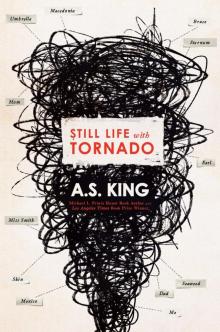 Still Life With Tornado
Still Life With Tornado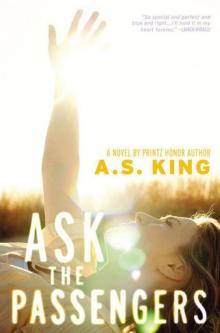 Ask the Passengers
Ask the Passengers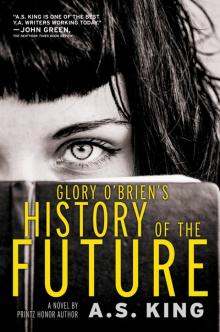 Glory O'Brien's History of the Future
Glory O'Brien's History of the Future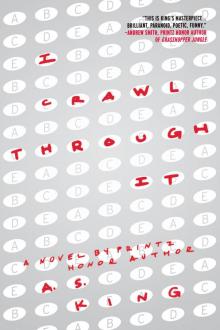 I Crawl Through It
I Crawl Through It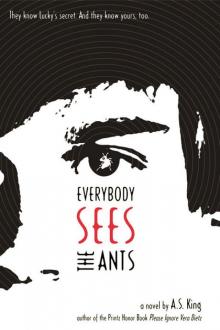 Everybody Sees the Ants
Everybody Sees the Ants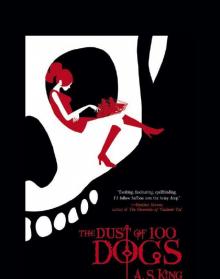 The Dust of 100 Dogs
The Dust of 100 Dogs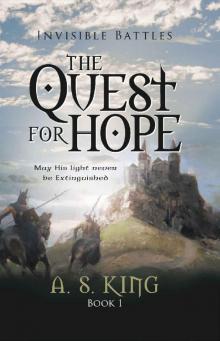 The Quest for Hope | Christian Fantasy Adventure (Invisible Battles Book 1)
The Quest for Hope | Christian Fantasy Adventure (Invisible Battles Book 1)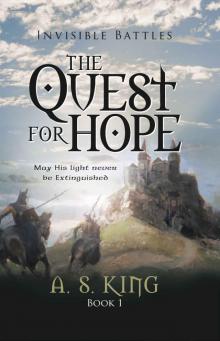 The Quest for Hope | Christian Fantasy Adventure
The Quest for Hope | Christian Fantasy Adventure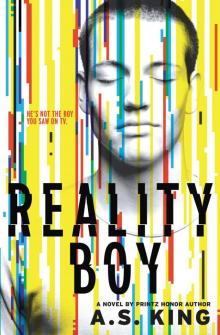 Reality Boy
Reality Boy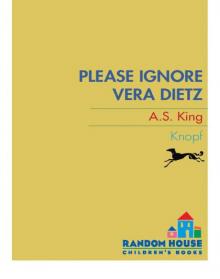 Please Ignore Vera Dietz
Please Ignore Vera Dietz